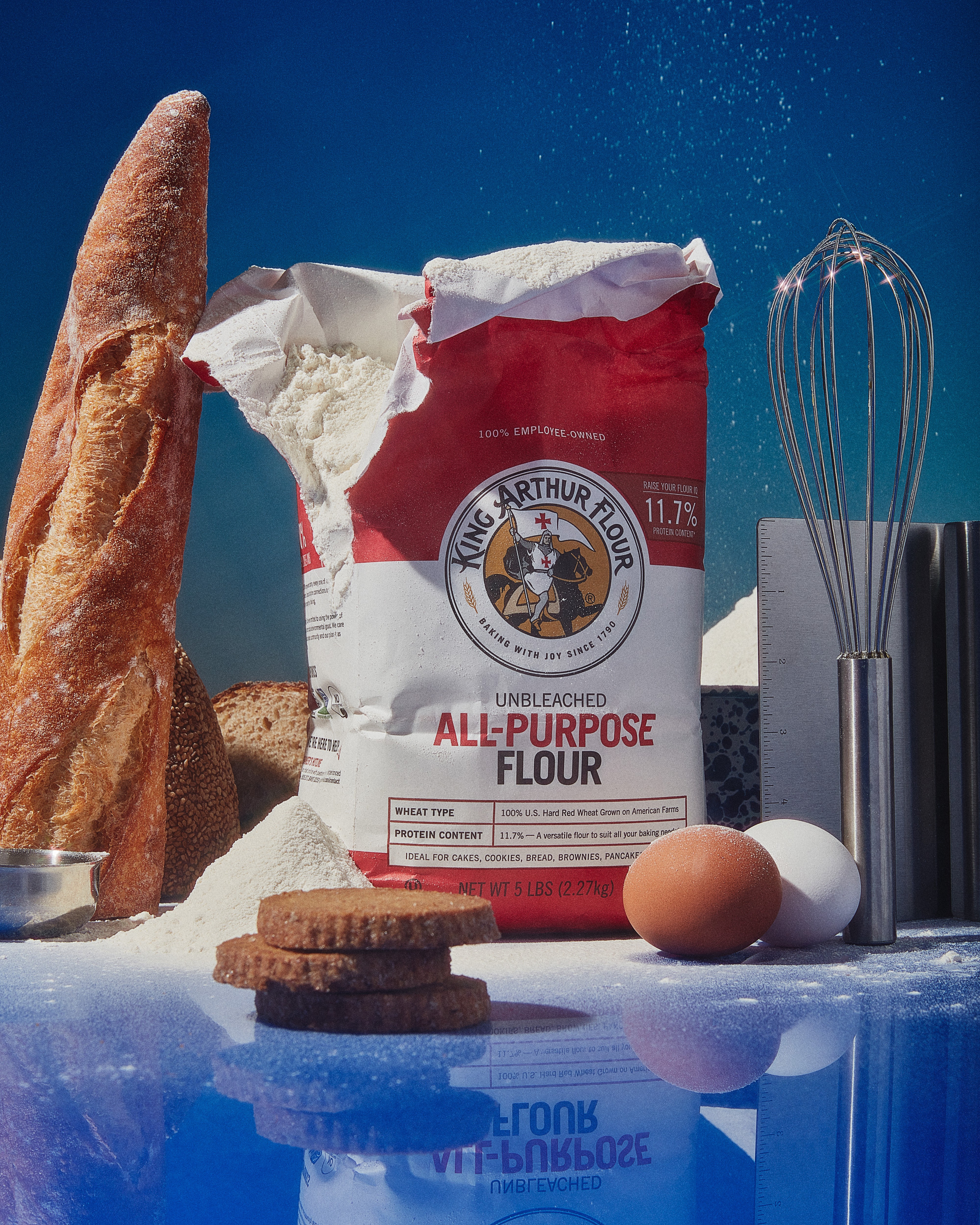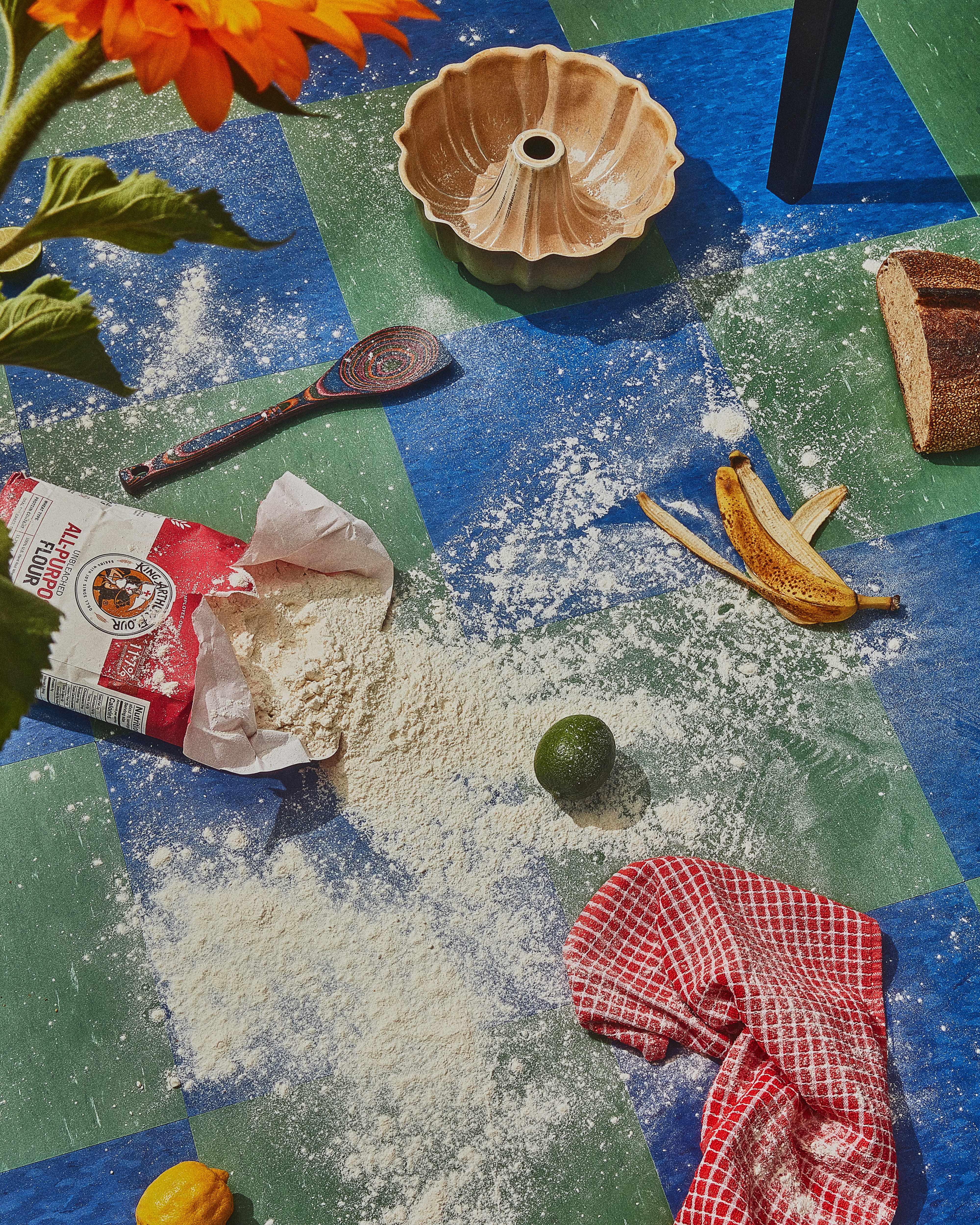 Photos: Stephanie Gonot
Photos: Stephanie Gonot
How King Arthur Flour found itself in the unlikely crosshairs of a pandemic

The fear of losing that hard-earned goodwill would set off a frantic effort at the employee-owned company to scale up production ? even as it was sending home most of its employee-owners, as the company calls them. At the same time, King Arthur had to manage perceptions among its customers, both new and old, to avoid looking as if it had abandoned them. ?We needed them to be patient, and to understand that we were doing everything we could to get them flour,? says Colberg.
And then, they had to deliver.
When Meaders Ozarow and her husband started an artisan bakery called the Empire Baking Company in Dallas 27 years ago, neither of them knew all that much about baking. But they got a piece of advice from a successful baker friend back East: Stick with King Arthur; it was the only major U.S. flour brand that approached Europe?s higher standards. ?We tried switching once to save money,? says Ozarow. ?But our head baker started complaining right away that he wasn?t getting a consistent rise, and the color was off. That wasn?t good, because people buy bread with their eyes.? They turned to King Arthur and haven?t looked back.
King Arthur?s pitch ? its high quality ? is basically the same one the company began with when it was founded in 1790 in Boston as an importer of European flour. When it switched to milling its own American wheat in the 1820s, it took more care than its major competitors throughout the manufacturing process, from selecting prime wheat, to milling only the heart of the wheat?s ?berries,? to leaving the natural creamy color unbleached. It even eschewed the addition of dough-stiffening bromate. The company also tightly controls and specifies to a decimal place (in prominent numbers right on the front of the package) the precise protein content of each its flours, a key factor in a baked good?s rise. Though all the extra pains carry a significant price premium of about 25% over its closest competitors, the payoff by most accounts is a more consistent, predictable, and appealing result in baking, particularly with bread.
By the 19th century King Arthur was a New England flour powerhouse, eventually outselling all other brands combined in the region four to one. In the late 20th century the company expanded nationally, and its 2019 sales topped $150 million. King Arthur?s bread flour is now the number one seller in America, and its all-purpose flour is outsold only by General Mills? Gold Medal brand.
The business, now the 14th oldest continuously operating manufacturer in America, has maintained a respectable average annual sales growth rate of about 10% in recent years, but it has been a fight to do so. It?s not so much the competition, though it?s formidable, including Gold Medal, Conagra?s Pillsbury, and Bob?s Red Mill?s artisan flours. Rather, the problem is that Americans have slowly but surely been home baking less and less for decades, and that trend has only accelerated with millennials, 40% of whom avoid gluten according to a 2016 survey. ?There?s been a shift away from carbs, and an even bigger shift toward eating more out of the house,? says Bill Tine, King Arthur?s vice president of marketing. Those sales-crimping trends have been offset to some extent by a growth in sales to bakeries, but that?s a lower-margin business.
Even as home baking was taking off, bakeries were being closed down, sharply reducing demand for the big bags of flour. Frustratingly, there was no good way to convert those production lines and the associated shipping logistics to fill and deliver the five- and 10-pound bags that made sense to consumers.
To swim against that tide, Colberg, who left the head merchandising role at the Gap to join King Arthur in 2005 as one of its two co-CEOs ? the other is former Goldman Sachs executive Ralph Carlton ? has helped lead a massive expansion of the company?s online sales and social media presence. The King Arthur website currently sells over 1,000 baking-related ingredients and tools, including spices, espresso powder, and parchment paper, as well as a constantly expanding line of distinct flours that now numbers 42, including white whole wheat, organic, grain-free, and pizza flours. (Coming soon: keto flour.) Meanwhile, an unending river of recipe and baking-tip posts, along with streaming baking demos, have catapulted the company to social media star status ? a March video of company ?baking educator? Amy Driscoll whipping up whole-wheat blueberry muffins drew nearly 50,000 views on Instagram. King Arthur now has well over half a million Instagram followers; Gold Medal has less than 3,300.
For over 200 years the company had been a case study in continual adaptation. Then the pandemic hit.
In retrospect, it doesn?t seem surprising that a public in anxious quarantine would turn to baking. ?People find baking extraordinarily positive and nurturing,? says Ely, who works on the Baker?s Hotline. The process is ritualistic and cathartic in pulling the baker into the moment and eating it lights up many of the brain?s strongest reward systems. It unlocks happy memories; it promotes shared delight. Even the smells are essential: Every real estate agent knows the odors of baking bread make a prospective home feel more like, well, your home.
Just one catch: You need flour. (While the crisis has also led to a yeast mania, it isn?t necessary for most baking, including bread-baking; you can opt for sourdough that relies on bacteria in the air to get a rise out of the dough.)

When the reality of the crisis finally registered at King Arthur headquarters, the company did what it always does: It called a meeting of the owners. Which, at King Arthur, means pretty much every one of the nearly 400 people who work at the company. In 2004, the family that had always controlled the company sold it to the employees, and now everyone who puts in at least one year at the company starts getting shares. ?It doesn?t matter here if you?re the CEO or you?re on the floor filling orders, you have a say in what goes on,? says Carey Underwood, director of mission-driven partnerships and programs at the company.
Reasonably enough, the first thing the employee-owners decided at the meeting was that they needed to protect their own welfare. The company immediately implemented a paid leave for anyone who felt they had any symptoms of Covid-19. Within a week, every employee who didn?t have to be physically at the company was working at home. The company closed down its caf-bakery, store, and baking school, which together have helped make King Arthur the third-busiest tourist destination in Vermont. Social-distancing measures thinned out employee ranks at the shipping facilities. (The store has since opened for pickup, doing about 10% of its normal business.)
Altogether, three-quarters of the company?s employees were sent home. In many cases, the work went with them, as was the case with the Baker?s Hotline, and with most managers. Many of those whose jobs couldn?t be performed at home were trained to help out with tasks that could. So far, not a single employee has been furloughed; everyone is being paid ? including 12 employees who stay busy sewing masks for other employees.
Of course, millions of businesses of all sizes and types across America and throughout the world were sending employees home, even if on much less generous terms. But most of these companies were also facing a catastrophic drop in business. At King Arthur, business was beyond booming. The magnitude of the swell was especially clear through the number of visitors to the website, most hoping to buy flour online. ?Our all-time record for traffic was last year, on the day before Thanksgiving,? says Tine. ?We broke that record on March 15, and we?ve surpassed it every single day since then.? On some days the site now sees nearly a million visitors. Though there?s no good way of tracking how many people are looking for flour on grocery shelves, it seemed clear that stores were seeing a similar surge. The huge demand quickly wiped out both direct-sales and store inventories, even though the company had stored up enough to meet the expected Easter wave.
Materials weren?t a problem; there was plenty of wheat available, since wheat stores well for a year or more, and stockpiles were high when the pandemic struck. The challenge was getting it milled and bagged quickly enough. And in fact, the flow of inventory from mills and packaging facilities was uninterrupted. Train cars and trucks were still being loaded up with pallets stacked high with five- and 10-pound bags of flour.
But as soon as a truckload of 8,600 bags were unloaded at the company?s fulfillment centers, they were flying out the doors to customers, leaving the company out of stock until the next truck came in. It was the same pattern at grocery stores. As far as most consumers could tell, there was no flour anywhere, at any time, even though about half a million bags a week were being sold. ?A shipment of product would come in the morning and be gone in a few hours,? says Underwood. ?If your trip to the store or your visit to the website didn?t line up exactly with those short times, you?d never see any.?
Pressed to produce more, the company formed a crisis response team, which met via video chat three times a day, every day, for the first several weeks after the initial surge in demand. ?The first thing we had to do was agree on what we could accomplish,? says Colberg. ?During a crisis there are a lot of problems to solve, and you won?t be able to solve them all. We decided the one we had to solve was how to get more all-purpose flour to consumers.?
The company fielded 50,000 questions in April ? about half of them asking where to find flour.
The team briefly looked at the one part of its production capacity that was going largely untapped: the group of facilities dedicated to producing the 50-pound bags that shipped, usually in quantity, to bakeries and other food-service businesses. While home baking was taking off, bakeries were being closed down, sharply reducing demand for the big bags of flour. (To help keep some of them afloat, the company has spent $30,000 so far during the pandemic paying some of its bakery customers around the country ? including Empire Baking ? to bake bread and donate it to local good causes. Its own bakers have been doing the same for essential workers and those in need in Norwich.) But, frustratingly, there was no good way to convert those production lines and the associated shipping logistics to fill and deliver the five- and 10-pound bags that made sense to consumers.

As a first step to ramping up the flow of flour to consumers, King Arthur added one to two shifts at all its facilities and contracted with an additional fulfillment center. It shifted most of its long-distance product transportation from rail to trucks, which are more expensive per bag but add speed and flexibility. It stopped international sales to divert all incoming inventory to U.S. customers. To make shipping operations more efficient and get orders out the door faster, the company switched to all ?ship-complete? shipping ? that is, if one item in a multi-item order was temporarily out of stock, the entire order was held until the item was back in stock.
The company also managed to find a new partner that could mill and bag more flour. The wrinkle was that the partner was only set up to fill three-pound plastic bags, not King Arthur?s five- and 10-pound paper bags. So King Arthur quickly whipped up a new three-pound plastic bag and threw it up on the website as a new product. That move alone would add up to a half-million new units a month to the company?s shipments. ?It was an expensive solution, so it will be a temporary offering,? says Tine. ?But we expect to keep it available for at least three months.?
Altogether, the various efforts nearly tripled King Arthur?s monthly combined output of all-purpose and bread flour to about 7 million bags. But the goal wasn?t just higher volume ? it was also to distribute flour to the maximum number of customers, throughout the country. So they limited online purchases of any one type of the most popular flours to two bags.
Even with the vastly ramped-up output, supply isn?t expected to catch up to demand until about midsummer at the earliest, says Colberg. That means millions of customers would continue to feel frustrated until then by a lack of availability. Addressing that problem required a different approach. ?We had to do three things,? she says. ?Communicate, communicate, and communicate.?
So they quickly turned employees from their caf-bakery and baking school into social media mavens and Bakers Hotline agents, doubling the size of both teams in only a few weeks. The hotline has been handling calls at twice the normal rate, taking some 11,000 calls in April, mostly from baking newbies. ?People are chatty,? says Ely. ?I get the sense some of them are pretty lonely.? Email from consumers has quadrupled and combined with questions that come in over social media the company fielded 50,000 questions in April ? about half of them asking where to find flour. The company has two new YouTube baking shows: ?Isolation Baking? (in which King Arthur bakers create sourdough crumpets and five-grain bread in a socially distant kitchen) and ?Martin Bakes at Home? (in which a father-son duo tackle bagels and flourless fudge cookies). It also built a new studio on campus, complete with kitchen.
There have been no signs yet that consumer interest in flour is close to waning. Tine worries that a second wave of Covid-19 infections sending the nation back into quarantine could potentially coincide with the normally busy season leading up to Thanksgiving and the December holiday season. But he remains hopeful that one day when the quarantine-driven rush comes to an end ? and people can once again meet up at cafs and bars and gyms and restaurants ? that the home-baking revival won?t entirely disappear. ?I think the pandemic will reverse the decline we?ve been seeing for a while,? he says. ?The interest could stick around for years.?


